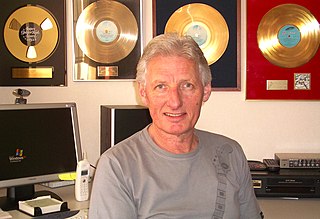Flying Nun Records is an independent record label formed in Christchurch, New Zealand, in 1981 by music-store manager Roger Shepherd.
David Joseph Dobbyn is a New Zealand musician, singer–songwriter and record producer. In his early career he was a member of the rock group Th' Dudes and was the main creative force in pop band DD Smash. Since then he has released the majority of his recordings as a solo performer.
Mark Bell is a New Zealand musician and songwriter. He has played in bands such as The Plague, The Whizz Kids, Blam Blam Blam, Coconut Rough and Ivan Zagni's Big Sideways. He currently works as a session musician in New Zealand. He is a member of Jordan Luck's band Luck.
Fane Michael Flaws is a New Zealand musician, songwriter, and artist. He was a member of bands including Blerta, Spats and The Crocodiles. Until joining Blerta he was known by his second name Michael: Bruno Lawrence insisted Fane was a better name.
Upper Hutt Posse (UHP) is a musical band in New Zealand. The progenitors of hip hop music in the South Pacific originally formed as a four-piece reggae group in 1985, the Posse emerged at the forefront of the local response to emerging rap culture. Their unique fusion of rap and reggae has been an inspirational injection into the national music scene, and a powerful vehicle for their revolutionary socio-political perspectives. Influenced primarily by socio-politically conscious reggae and rap music, from Bob Marley to Gil Scott-Heron to Public Enemy. The band name is derived from Upper Hutt, the city in which they formed.

Jan Hellriegel is a singer/songwriter based in Auckland, New Zealand.
Shayne P Carter is a musician best known for leading Straitjacket Fits from 1986–1994, and as the only permanent member of Dimmer (1995–2012).

Flight of the Conchords are a New Zealand comedy duo composed of musicians Bret McKenzie and Jemaine Clement. The duo's comedy and music became the basis of a BBC radio series and then an American television series that aired for two seasons on HBO. They previously referred to themselves as "New Zealand's fourth most popular guitar-based digi-bongo acapella-rap-funk-comedy folk duo", but as of 2014 refer to themselves as "the almost award-winning fourth-most-popular folk duo in New Zealand".
The history of blues in New Zealand dates from the 1960s. The earliest blues influences on New Zealand musicians were indirect — not from the United States but from white British blues musicians: first the R&B styles of Fleetwood Mac, Eric Clapton, The Animals and The Rolling Stones, and later the blues-tinged rock of groups such as Led Zeppelin. The first American blues artist to make a big impact in New Zealand was Stevie Ray Vaughan in the early 1980s. Other blues-related genres such as soul and gospel almost completely by-passed New Zealand audiences, except for a handful of hits from cross-over artists such as Ray Charles.
Spacifix is a New Zealand funk/soul/R&B and reggae boy group from West Auckland, New Zealand. They formed in April 2003 with the view of entering the Smokefree Pacifica Beats national competition. Aged between 13 and 18 years they won the competition first time up. Until April 2005, the band played a number of festivals and concerts and increased their fan base in West Auckland.
Tim Mahon is a New Zealand musician who played in the Plague, the Whizz Kids and Blam Blam Blam. He was seriously injured in a road accident while on tour with Blam Blam Blam, leading to the band breaking up.
Greek New Zealanders (Ellinozilandoí) refers to New Zealand citizens and residents who are of full or partial Greek descent; either those who immigrated or are New Zealand-born. Large concentrations of the community are to be found in Wellington, and to a lesser extent Christchurch and Auckland. Smaller communities of Greeks reside in Palmerston North, Wanganui, Dunedin, Hamilton and Napier.
Low Profile were a New Zealand alternative rock band of the 1980s, formed by Phil Bowering and Steve Garden, recording on the Jayrem label.

Phillipa Margaret "Pip" Brown, better known by her stage name Ladyhawke, is a New Zealand singer-songwriter and multi-instrumentalist. She took her stage name from Richard Donner's 1985 film Ladyhawke.
The Wellington International Ukulele Orchestra is an ensemble of ukulele players based in Wellington, New Zealand. Apart from a double bass the band is composed entirely of ukuleles. Their repertoire consists mainly of covers of modern popular music and some ukulele and New Zealand standards. Costumes and comic banter are also part of the WIUO appeal.
Mark Austin is a New Zealand composer and musical director who has written scores for many films, television programmes and commercials. Much of his work has received critical acclaim. Besides writing alone, he has collaborated with David Long, Don McGlashan and Neill Duncan, among others. He has also worked in dance and theatre and was particularly active in this area in Auckland in the 1990s, where he was involved in several productions at the now defunct Watershed Theatre. With David Long, Austin has collaborated with dance choreographers Douglas Wright, Ann Dewey, Daniel Belton, and Mary Jane O’Reilly, and, on his own, with Josie Thompson. In 2002 he moved to his home town of Wellington. He continues to write soundtracks, in between commissions and other projects.
Ivan Zagni is a New Zealand-based musician and composer who has been a member of bands such as Jody Grind, Big Sideways and Avant Garage, and has recorded albums with Aynsley Dunbar, Elton Dean, Don McGlashan and Peter Scholes.

Magic is a New Zealand oldies radio network owned by MediaWorks New Zealand. The network is a direct competitor to New Zealand Media and Entertainment's Coast network, targeting New Zealand's growing population of baby boomers with a line-up of veteran broadcasters. Its breakfast show, Magic in the Morning, is hosted by high-profile television producer, game show host, sports commentator and radio announcer Mark Leishman. Its playlist, drawn from the 1950s to 1970s, includes music from Elvis Presley, The Beach Boys, Roy Orbison, Dusty Springfield and Rod Stewart.

Glyn Tucker Jnr was a leading figure in the New Zealand music industry for more than twenty years. Following an early career as a singer/songwriter in The Gremlins (1965–1968) he founded Mandrill Recording Studios in Auckland in 1975, and produced and engineered hundreds of New Zealand songs in the late seventies, eighties and early nineties.








